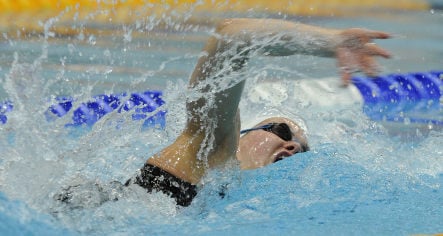Steffen, 25, said breaking the record was a lifetime dream along with winning Olympic gold, which she has already done twice. But she said the new kinds of suit were ruining the sport.
“My new suit is as if it comes from a different planet,” she said. “One swims as if on an air mattress, I am more than a second faster. Where is it going to lead?”
Steffen broke the 100 metres freestyle record by 3/100 of a second.
She also said the suits were going to be banned soon, which she welcomed: “This suit will no longer be allowed next year, which is a good thing, because this fight over materials is destroying swimming as a sport.”
She said she tried the ‘hydrofoil’ model only a week ago. “I thought, this was not possible,” she said. “This is the craziest thing I have ever worn. You lie on top of the water, don’t die in the last metres, you have no pain.”
The suits have been enormously controversial, with the world swimming association FINA allowing most of the new high-tech suits to be used at the start of the week, including the one worn by Steffens. Ironically, manufacturer Adidas cancelled its contract to provide equipment to the German Swimming Association at the end of 2008 over an argument that its suits were not competitive enough.
FINA is introducing tougher rules at the start of next year, after the 108 world records were broken while wearing the suits, causing concern within the swimming world.
Trainers and athletes criticised the allowance of the suits in world competition, while respected French sports newspaper L’Équipe has refused to recognise any new records until the suits are banned.



 Please whitelist us to continue reading.
Please whitelist us to continue reading.
Member comments